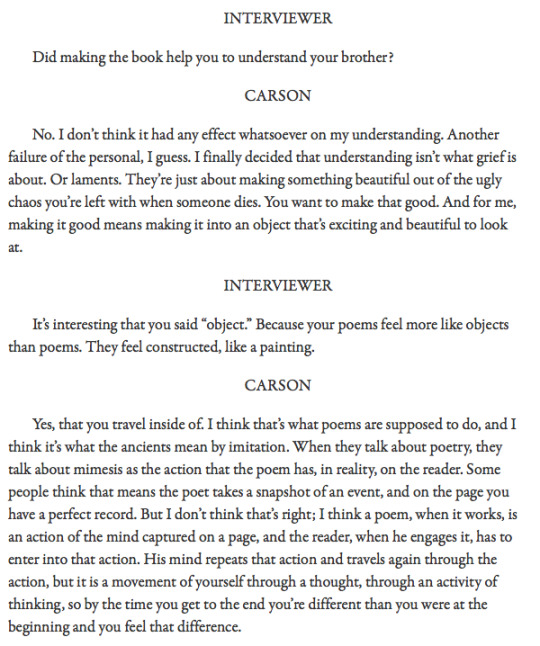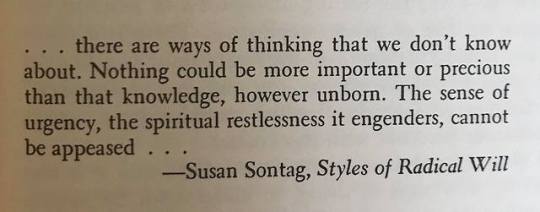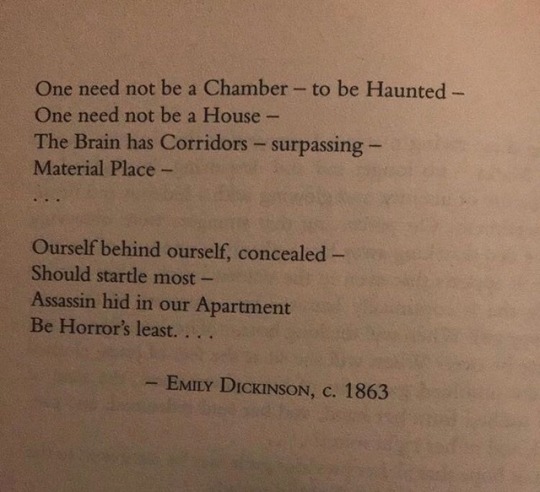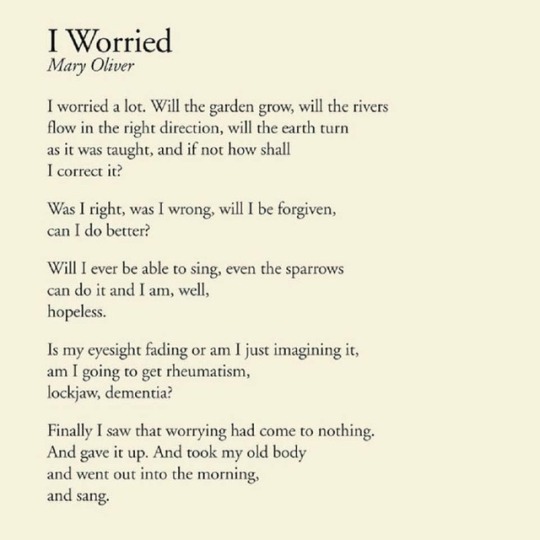Photo

anne carson
3K notes
·
View notes
Quote
I love your silences, they are like mine. You are the only being before whom I am not distressed by my own silences. You have a vehement silence, one feels it is charged with essences, it is a strangely alive silence, like a trap open over a well, from which one can hear the secret murmur of the earth itself.
Anaïs Nin, Under a Glass Bell
722 notes
·
View notes
Quote
I was always ashamed to take. So I gave. It was not a virtue. It was a disguise.
Anaïs Nin, The Diary Of Anais Nin, Vol. 4: 1944-1947
3K notes
·
View notes
Quote
Pictures swim together with memories like a slide show….Remembering them, re-remembering them, she wanders around the borders of her emotional ground zero, never quite approaching and never quite looking directly at it, hoping to find survivors of the place she ran away from.
Tracey Lindberg, Birdie
95 notes
·
View notes
Text
Andrea Dworkin, Intercourse
[In A Streecar Named Desire] Having been beaten by [Stanley Kowalski], his wife Stella waits for him, wanting him. She defends her willingness to accept the beating to her sister, Blanche Du Bois, who wants her to rebel: “But there are things that happen between a man and a woman in the dark — that sort of make everything else seem — unimportant.”” The wife, raised to be refined, wants the animal passion of her husband, not anything else that she has had or could be. All her past of sensibility and taste means nothing to her against the way her husband uses her in the dark. Blanche argues against the lowness of Stanley’s character and calling and for aspirations of her own, closer to tenderness:
He acts like an animal, has an animal’s habits! … There’s even something — subhuman — something not quite to the stage of humanity yet! … And you — you here — waiting for him! Maybe he’ll strike you or maybe grunt and kiss you! … In some kinds of people some tenderer feelings have had some little beginning! That we have got to make grow! And cling to, and hold as our flag! In this dark march toward whatever it is we’re approaching. … Don’t — don’t hang back with the brutes!
50 notes
·
View notes
Quote
How soft is the blackness as it falls. It falls in silence and yet it is deafening, for no other sound except the blackness falling can be heard. The blackness falls like soot from a lamp with an untrimmed wick. The blackness is visible and yet it is invisible, for I see that I cannot see it. The blackness fills up a small room, a large field, an island, my own being. The blackness cannot bring me joy but often I am made glad in it. The blackness cannot be separated from me but often I can stand outside it. The blackness is not the air, though I breathe it. The blackness is not the earth, though I walk on it. The blackness is not water or food, though I drink and eat it. The blackness is not my blood, though it flows through my veins.
Jamaica Kincaid, “Blackness,” At the Bottom of the River
692 notes
·
View notes
Quote
Empathy isn’t just remembering to say that must really be hard—it’s figuring out how to bring difficulty into the light so it can be seen at all. Empathy isn’t just listening, it’s asking the questions whose answers need to be listened to. Empathy requires inquiry as much as imagination. Empathy requires knowing you know nothing. Empathy means acknowledging a horizon of context that extends perpetually beyond what you can see.
Leslie Jamison, The Empathy Exams
1K notes
·
View notes
Quote
I was obsessed with loss; not surprisingly, I was also acquisitive, possessive. The two tendencies fed each other; every impulse to extend my holdings increased the fundamental anxiety. Actual loss, loss of mere property, was a release, an abrupt transition from anticipation to expertise. In passing, I learned something about fire, about its appetite. I watched the destruction of all that had been, all that would not be again, and all that remained took on a radiance. These are, in the deepest sense, ordinary experiences. On the subject of change, of loss, we all attain to authority. In my case, the timing was efficient. I was in my late thirties; perhaps I’d learned all I could about preparation, about gathering. The next lesson is abandon, letting go.
Louise Glück, “106,″ Proofs and Theories: Essays on Poetry
925 notes
·
View notes
Quote
There is a distinction I am beginning to make in my living between pain and suffering. Pain is an event, an experience that must be recognized, named, and then used in some way in order for the experience to change, to be transformed into something else, strength or knowledge or action.
Suffering, on the other hand, is the nightmare reliving of unscrutinized and unmetabolized pain. When I live through pain without recognizing it, self-consciously, I rob myself of the power that can come from using that pain, the power to fuel some movement beyond it. I condemn myself to reliving that pain over and over and over whenever something close triggers it. And that is suffering, a seemingly inescapable cycle.
And true, experiencing old pain sometimes feels like hurling myself full force against a concrete wall. But I remind myself that I HAVE LIVED THROUGH IT ALL ALREADY, AND SURVIVED.
Audre Lorde, “Eye to Eye: Black Women, Hatred, and Anger,” Sister Outsider
446 notes
·
View notes
Quote
The duty of literature is to dig to the bottom. We are a subject not only unpredictable but unknown even to ourselves. We have an urgent need for representation and for an ethics of our own. We have the right and the duty to explore ourselves thoroughly, to slip away, to cross the borders that make us suffer. I insist on self-surveillance, which means choice, assumption of responsibility, and the necessity of losing restraint in order to know ourselves, not lose ourselves.
Sheila Heti, “Be Silent, Recover My Strength, Start Again” In Conversation with Elena Ferrante”
560 notes
·
View notes
Quote
I do want to create art beyond rage. Rage is a place to begin, but not end. I’m not as wise as my work, but I know if I take the writing deep enough, something larger and greater than myself will flash forth and illuminate me, heal me. I do want to devour my demons—despair, grief, shame, fear—and use them to nourish my art. Otherwise they’ll devour me.
Sandra Cisneros, “I Can Live Sola and I Love to Work,” A House of My Own: Stories From My Life
374 notes
·
View notes
Quote
I was not surprised that these poems would elicit such praise. Although they were read and were circulating in a climate of timid, but rising opposition to the war (not for the right reasons though) their vision did not challenge or problematize, in any way, the reigning official narrative of and about the war. They did represent the visceral violence of the war, of course, but they never questioned the genealogy of the war itself nor its ideological edifice. What the poems do is humanize the soldier (in a volunteer army) and represent him as a victim, at the expense of civilians (Iraqis). Or, at best, they posit an equivalence between soldiers and civilians. That is quite problematic since being a civilian in a war zone is not voluntary, but being a soldier in the US’s war machine is.
The war in Iraq is over. "We" tried to help those wretched Iraqis, but it was all just too messy (Sunnis, Shi`ites, Iran. . . etc). "Mistakes were made" along the way. Iraqis will have to fend for themselves. This narrative, with a few variations, is parroted by the mainstream chorus. It obfuscates the tragic reality that is Iraq and absolves the authors of the war of any responsibility.
The civilian victims are disappeared.
The soldiers are the victims.
Did the war wage itself?
Sinan Antoon, “Embedded Poetry: Iraq; Through a Solider’s Binoculars”
47 notes
·
View notes
Photo

221 notes
·
View notes
Quote
If I could have one wish for my own sons, it is that they should have the courage of women. I mean by this something very concrete and precise: the courage I have seen in women who, in their private and public lives, both in the interior world of their dreaming, thinking, and creating, and the outer world of patriarchy, are taking greater and greater risks, both psychic and physical, in the evolution of a new vision.
...Every woman who takes her life into her own hands does so knowing that she must expect enormous pain, inflicted both from within and without. I would like my sons not to shrink from this kind of pain, not to settle for the old male defenses, including that a fatalistic self-hatred. And I would wish them to do this not for me, or for other women, but for themselves, and for the sake of life on the planet Earth.
Adrienne Rich, Of Woman Born: Motherhood as Experience and Institution
79 notes
·
View notes
Quote
I treat myself like I would my daughter. I brush her hair, wash her laundry, tuck her in goodnight. Most importantly, I feed her. I do not punish her. I do not berate her, leave tears staining her face. I do not leave her alone. I know she deserves more. I know I deserve more.
Michelle K., I Know I Deserve More
3K notes
·
View notes
Photo

240 notes
·
View notes
